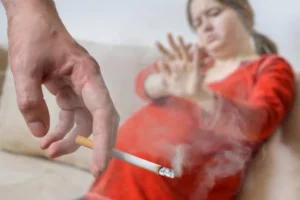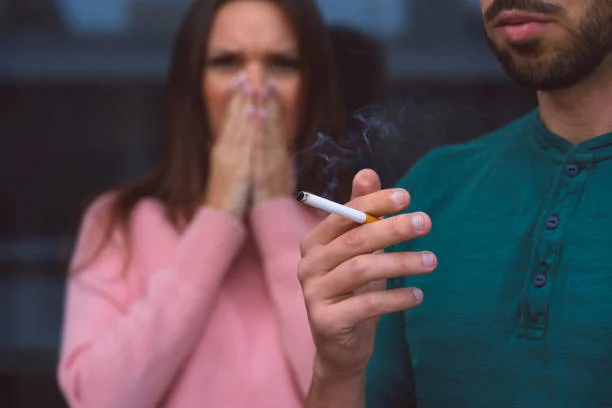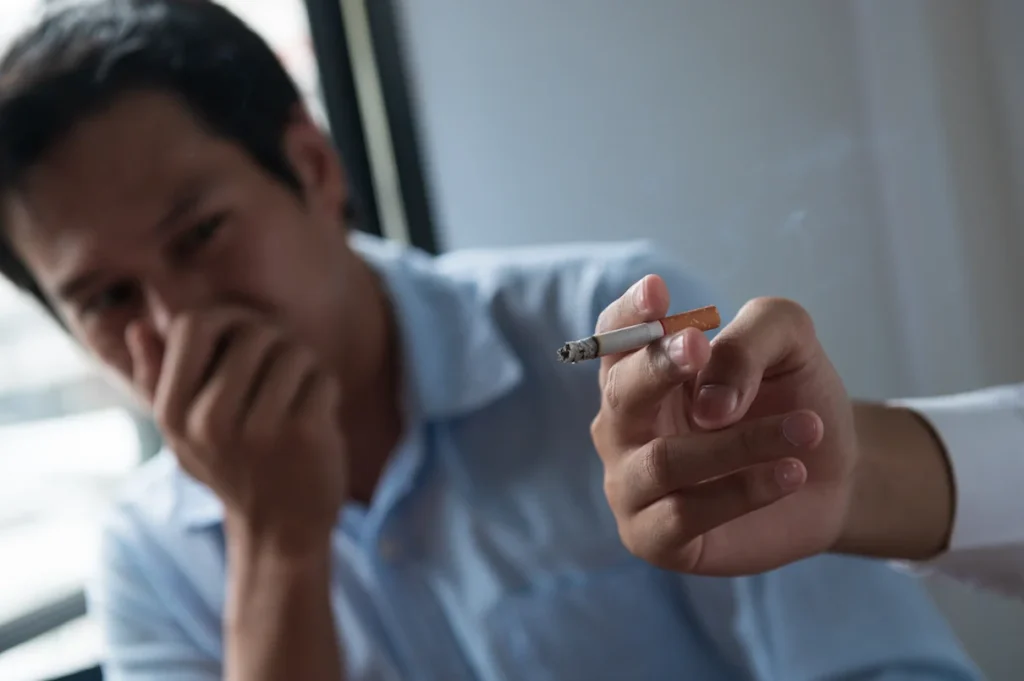Have you ever walked through a cloud of smoke on the street, or sat near someone smoking at a restaurant, and wondered how it might be affecting your health? Secondhand smoke isn’t just a nuisance—it can have serious health implications for everyone around.
In this blog, we’re going to explore exactly how secondhand smoke can affect your health, from the irritating short-term effects to the potential for serious long-term health issues. We’ll also provide you with effective strategies to protect yourself and your loved ones, and discuss what measures can be taken to minimize exposure in public spaces. Whether you’re a smoker or a non-smoker, understanding these impacts is crucial for making informed decisions about your health and wellbeing.
Contents
What is Secondhand Smoke?
 Secondhand smoke, also known as environmental tobacco smoke (ETS), is a mixture of two forms of smoke that come from burning tobacco products, such as cigarettes, cigars, or pipes.
Secondhand smoke, also known as environmental tobacco smoke (ETS), is a mixture of two forms of smoke that come from burning tobacco products, such as cigarettes, cigars, or pipes.
Composition of Secondhand Smoke:
- Mainstream Smoke
This is the smoke exhaled by a smoker. It has been filtered through the cigarette and the smoker’s lungs, which removes some of the toxins, although many harmful chemicals still remain. - Sidestream Smoke
This smoke comes directly from the burning tobacco product. It makes up the majority of secondhand smoke and is a more dangerous component due to its higher concentrations of cancer-causing substances and smaller particles that penetrate the lungs more deeply.
Why Secondhand Smoke Is Harmful:
- Contains over 7,000 chemicals, of which hundreds are toxic and about 70 can cause cancer.
- Linked to various health problems in nonsmokers, including respiratory infections, heart disease, and lung cancer. For children, it increases the risk of sudden infant death syndrome (SIDS), asthma, respiratory infections, and ear problems.
- There is no safe level of exposure to secondhand smoke; even brief contact can be harmful to health.
Understanding what secondhand smoke is and recognizing its dangers are vital steps in protecting yourself and others from its harmful effects.
Immediate Health Effects of Secondhand Smoke
 Exposure to secondhand smoke can lead to several immediate health issues, even after short periods of inhalation. These effects are not just unpleasant; they can also be a sign of the harmful impact the smoke is having on your body. Here’s what you might experience shortly after exposure to secondhand smoke:
Exposure to secondhand smoke can lead to several immediate health issues, even after short periods of inhalation. These effects are not just unpleasant; they can also be a sign of the harmful impact the smoke is having on your body. Here’s what you might experience shortly after exposure to secondhand smoke:
Respiratory Issues:
- Non-smokers exposed to secondhand smoke may experience coughing, wheezing, and a feeling of tightness in the chest.
- Increased Severity of Asthma Symptoms: For people with asthma, secondhand smoke can trigger more frequent and severe attacks.
Eye Irritation:
- Soreness and Itching: The chemicals in secondhand smoke can irritate the eyes, leading to redness, itchiness, and discomfort. In some cases, this can also lead to watering eyes and blurred vision.
Headaches:
- Smoke-induced Headaches: The toxins in secondhand smoke can trigger headaches in some individuals.
Other Immediate Effects:
- Nausea and Dizziness
- Increased Heart Rate
These immediate effects not only cause discomfort but also signal the body’s adverse reactions to the harmful chemicals in secondhand smoke. Understanding these impacts emphasizes the need for maintaining smoke-free environments to protect oneself and others, especially those who are most vulnerable like children and individuals with chronic health conditions.
Secondhand Smoke and Children
 Children are particularly vulnerable to the effects of secondhand smoke due to their still-developing bodies and lungs. Exposure to secondhand smoke in children can lead to severe and long-lasting health consequences. Understanding these risks is crucial for protecting our younger populations.
Children are particularly vulnerable to the effects of secondhand smoke due to their still-developing bodies and lungs. Exposure to secondhand smoke in children can lead to severe and long-lasting health consequences. Understanding these risks is crucial for protecting our younger populations.
- Children exposed to secondhand smoke are at a higher risk of developing asthma.
- Secondhand smoke compromises the immune system, making it easier for children to catch colds, bronchitis, pneumonia, and other respiratory infections.
- Can affect the normal development of a child’s lungs, leading to reduced lung function that lasts into adulthood.
- Increased risk of middle ear infections (otitis media), which can lead to hearing loss and other complications if not properly treated.
Additional Considerations:
- Infants exposed to secondhand smoke have a higher risk of SIDS. Chemicals in the smoke appear to affect the brain in ways that interfere with its ability to regulate breathing.
- Studies have shown that children exposed to secondhand smoke are more likely to experience problems with learning, attention, and behavior, likely due to the toxins affecting brain development.
The vulnerability of children to the harmful effects of secondhand smoke underscores the importance of maintaining smoke-free environments around them, particularly in homes and cars.
Does Secondhand Smoke Affect the Brain?

Yes, secondhand smoke can indeed affect the brain, particularly in non-smokers who are frequently exposed to it. The impact on the brain is especially concerning for children and adolescents, whose brains are still developing, but adults are also at risk. Here’s how secondhand smoke influences brain function:
Neurological Impact on Children
- The chemicals in secondhand smoke could interfere with brain development and function. This can worsen their cognitive skills, including reading, mathematics, and spatial reasoning.
- Moreover, it is also linked with increased rates of behavioral problems in children, such as hyperactivity, attention deficits, and conduct disorders.
Effects on Adult Brains
- Cognitive Decline: Adults exposed to secondhand smoke may experience faster cognitive decline than those not exposed. Studies suggest that the inhalation of smoke can lead to inflammation and vascular changes in the brain, which contribute to cognitive deficits.
- Psychological Effects: There is evidence to suggest that secondhand smoke exposure in adults can lead to increased stress, anxiety, and depression. The toxic substances in smoke may alter neurotransmitter levels in the brain, affecting mental health.
The evidence clearly supports that secondhand smoke has detrimental effects on brain health across all ages. It underlines the importance of protecting individuals, especially children, from exposure to smoke and advocating for strict policies to maintain smoke-free environments.
How to Protect Yourself and Your Family from Secondhand Smoke
 Minimizing exposure to secondhand smoke is crucial for maintaining good health, especially for children and non-smoking adults. Here are practical steps you can take to protect yourself and your family from the harmful effects of secondhand smoke in various environments:
Minimizing exposure to secondhand smoke is crucial for maintaining good health, especially for children and non-smoking adults. Here are practical steps you can take to protect yourself and your family from the harmful effects of secondhand smoke in various environments:
At Home:
- Ensure that smoking is not allowed inside your home.
- Ask family members and guests to smoke outside, away from windows, doors, and ventilation systems to prevent smoke from being drawn inside.
- Use air purifiers
In Public Places:
- Opt for dining and entertainment venues that enforce strict no-smoking policies.
- If your local community or favorite public place doesn’t have smoking restrictions, advocate for the implementation of such policies.
At Work:
- If your workplace allows smoking, advocate for the adoption of a smoke-free policy.
- Present evidence on the health risks associated with secondhand smoke to management.
- If changing policy isn’t immediately possible, request that designated smoking areas be set up away from common areas and building entrances to minimize non-smokers’ exposure.
While Traveling:
- Choose smoke-free accommodations
- Opt for non-smoking taxis and rental cars
By taking these proactive measures, you can significantly reduce your and your family’s exposure to secondhand smoke, thereby lowering the associated health risks. Protecting against secondhand smoke not only contributes to your immediate well-being but also to long-term health.
Conclusion
Exposure to secondhand smoke can have serious health consequences, not just for smokers but for everyone around them. If you or a loved one is dealing with the effects of smoking addiction, it’s crucial to take steps towards a healthier environment for everyone involved.
At QuitMantra, we understand the challenges faced by individuals and families affected by smoking addiction. Visit our website today and explore how our deaddiction programs can help you or your loved one quit smoking for good.
